Matterson Surname Ancestry ResultsOur indexes 1800-1900 include entries for the spelling 'matterson'. In the period you have requested, we have the following 45 records (displaying 1 to 10): Single Surname Subscription | | | Buying all 45 results of this search individually would cost £230.00. But you can have free access to all 45 records for a year, to view, to save and print, for £100. Save £130.00. More... |
These sample scans are from the original record. You will get scans of the full pages or articles where the surname you searched for has been found. Your web browser may prevent the sample windows from opening; in this case please change your browser settings to allow pop-up windows from this site. Inhabitants of Bath, in Somerset
(1805)
Holden's Triennial Directory of 1805 to 1807 included a provincial section, listing professional people and traders in England, Wales, Scotland and Ireland. (The sample scan here is from the listing for Bath)MATTERSON. Cost: £6.00.  | Sample scan, click to enlarge
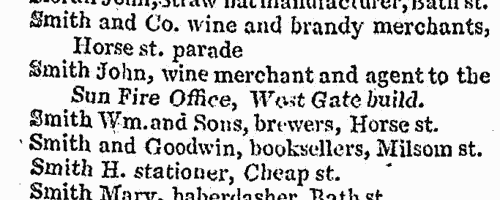
| Deaths, Marriages, News and Promotions
(1810)
Death notices and obituaries, marriage and birth notices, civil and military promotions, clerical preferments and domestic occurrences, as reported in the Gentleman's Magazine. Mostly from England and Wales, but items from Ireland, Scotland and abroad.
MATTERSON. Cost: £4.00.  | Sample scan, click to enlarge

| Subscribers to the Wesleyan Methodist preachers' schools
(1814-1815)
Children of Wesleyan Methodist preachers could be educated by the church at their schools at Kingswood and Woodhouse Grove. These schools were supported by subscriptions and donations raised in local congregations throughout England and Wales, and in some years the individuals making larger donations are listed in the annual minutes, grouped together by congregation.MATTERSON. Cost: £6.00.  | Sample scan, click to enlarge
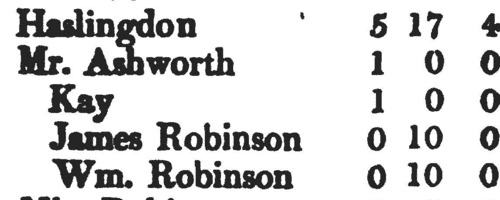
| Yorkshire West Riding Freeholders
(1817)
A ballot was held at Wakefield 12 to 16 May 1817 for the choice of a new Register (registrar) for the West Riding Registry of Deeds, following the death of J. A. Busfeild esq. The candidates were Francis Hawksworth, esq. (1) and William Lister Fenton Scott esq. (2). 2544 freeholders voted, qualification being male adults in possession of at least £100 per annum. This alphabetical poll book was compiled from the scrutators' and poll clerks' books: it gives full name (surname first) and residence, as well as the situation of the qualifying freehold. Each man's name is preceded by a 1 or 2, indicating for whom his vote was cast.MATTERSON. Cost: £6.00.  | Sample scan, click to enlarge

| Workers at Pollard's Cotton Mill, Manchester
(1818)
The minutes of evidence taken before the Lords Committee on the Cotton Factories Bill include a series of reports by medical men as to the general health of the mill workers in April 1818. For each factory there is a complete list of workers, giving full name, age, how long employed in a factory, health (in general terms, such as 'Good' or 'Sickly'), and any chronic disease or 'distortion', cause and duration - with slight variations from report to report. The physicians examined several hundred people each day, asking such questions as 'Have you any swellings or sores anywhere?', 'Are your limbs straight?', 'Have you a good appetite for food?', 'Do you conceive yourself to be in good health?', and all concluded that the health of the mill workers was good, and that the workers were cheerful. This is the report for Pollard's spinning mill in Manchester, 20 April 1818.MATTERSON. Cost: £6.00.  | Sample scan, click to enlarge

| Boys entering Leeds Grammar School
(1832)
The admission books for Leeds Grammar School from 1820 to 1900 were edited by Edmund Wilson and published in 1906. The series of registers is almost complete for the period, there being in addition admission registers for the Lower (or Commercial) Department from 1856 to 1865, and lists of boys in the school in 1856, and in the Commercial Department in 1861. The entries are arranged by date or term of admission: a sequential number is given first, then surname, christian name, and, after a dash, father's christian name, occupation, and address; another dash, and then the age of the boy at admission, and often his year of leaving (with the abbreviation r. for 'removed' or 'left'). r.* means left without notice; (o) or S. or Stranger or Foreigner indicates a boy not on the foundation. The editor was unable to divine the meaning of the abbreviation (Q) or the asterisks prefixed to most entries in 1856 to 1860, but dutifully copies them into the text. In smaller type he then proceeds, where possible, to add some information about the boy's subsequent career.MATTERSON. Cost: £4.00.  | Sample scan, click to enlarge
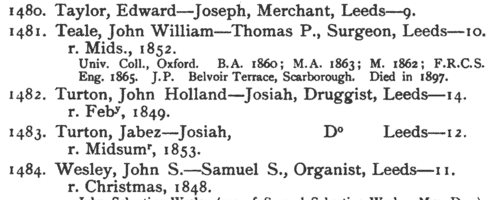
|  British merchant seamen
(1835-1836) British merchant seamen
(1835-1836)
At this period, the foreign trade of ships plying to and from the British isles involved about 150,000 men on 15,000 ships; and the coasting trade about a quarter as many more. A large proportion of the seamen on these ships were British subjects, and so liable to be pressed for service in the Royal Navy; but there was no general register by which to identify them, so in 1835 parliament passed a Merchant Seamen's Registration Bill. Under this act this large register of British seamen was compiled, based on ships' crew lists gathered in British and Irish ports, and passed up to the registry in London. Each seaman was assigned a number, and the names were arranged in the register by first two letters of the surname (our sample scan shows one of the pages for 'Sm'); in addition, an attempt was made to separate out namesakes by giving the first instance of a name (a), the second (b), and so on. But no effective method was devised to prevent the same man being registered twice as he appeared in a second crew list; moreover, the original crew lists were clearly difficult for the registry clerks to copy, and some of the surname spellings appear to be corrupted. A parliamentary committee decided that the system devised did not answer the original problem, and this register was abandoned after less than two years: but it is an apparently comprehensive source for British merchant seamen in 1835 to 1836. The register records the number assigned to each man; his name; age; birthplace; quality (master, captain, mate, 2nd mate, mariner, seaman, fisherman, cook, carpenter, boy &c.); and the name and home port of his ship, with the date of the crew list (usually at the end of a voyage). Most of the men recorded were born in the British Isles, but not all (for instance, Charleston and Stockholm appear in the sample scan). The final column 'How disposed of' is rarely used, and indicates those instances where a man died, was discharged, or deserted his ship during the voyage.MATTERSON. Cost: £8.00.  | Sample scan, click to enlarge
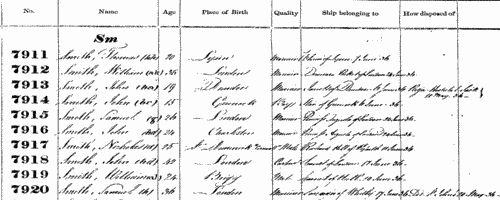
| Dissolutions of Partnerships
(1837)
Trade partnerships dissolved, or the removal of one partner from a partnership of several traders: in England and Wales
MATTERSON. Cost: £6.00.  | Sample scan, click to enlarge

| Shareholders of the Northumberland and Durham District Banking Company
(1838)
The provincial banks of England and Wales made annual returns to the Stamp Office of their proprietors or shareholders. These returns, registered in March 1838, from the 103 banks then in existence, contain the full names and addresses of nearly 30,000 shareholders.MATTERSON. Cost: £6.00.  | Sample scan, click to enlarge
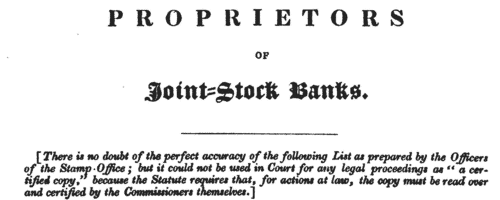
| Shareholders of the Western District Banking Company
(1838)
The provincial banks of England and Wales made annual returns to the Stamp Office of their proprietors or shareholders. These returns, registered in March 1838, from the 103 banks then in existence, contain the full names and addresses of nearly 30,000 shareholders. This bank was based in Devon and Cornwall.MATTERSON. Cost: £6.00.  | Sample scan, click to enlarge
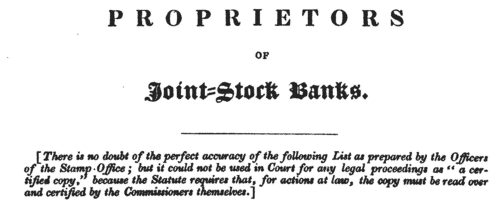
|
Research your ancestry, family history, genealogy and one-name study by direct access to original records and archives indexed by surname.
|













